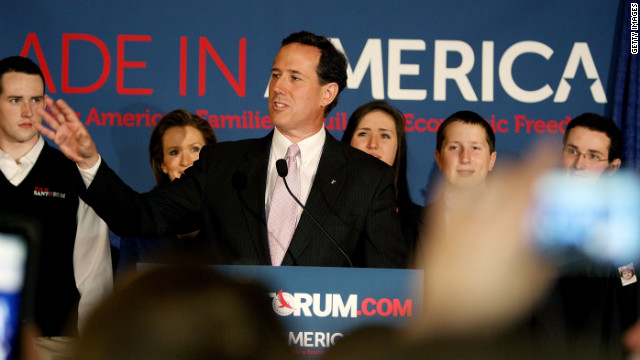
- Rick Santorum wins two more Southern states
- Mitt Romney finishes 3rd in both states, fails to garner conservative support in South
- Newt Gingrich says he has no intention to drop out of race
(CNN) -- Republican voters in Alabama and Mississippi handed Rick Santorum two more wins on Tuesday and conservative support continued to elude Mitt Romney. Plus, Newt Gingrich found reason to continue his campaign despite losing both southern states. Here are five things we learned from Tuesday night.
Turnout mattered: It's one of the most tired clich�s in politics, but unfortunately for Romney, it happened to be true in certain parts of Mississippi, where his campaign was confident about a victory.
Turnout statewide was over 250,000 -- less than the 300,000 voters who showed up in the 2011 GOP gubernatorial primary, but still on par with what many political observers in the state had expected.
"Romney ran the best in the metro areas but not by as big a margin as we wanted," said Henry Barbour, a longtime GOP operative and Romney supporter in Mississippi.
Romney had to rack up big numbers in the Jackson metro area, particularly the larger suburban counties of Rankin and Madison.
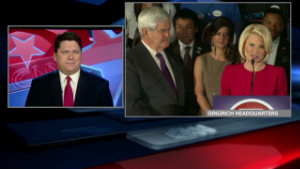
 Gingrich adviser on Santorum success
Gingrich adviser on Santorum success 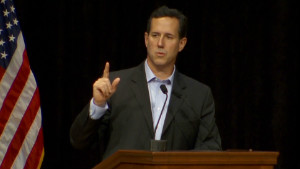
 Who is tonight's delegate winner?
Who is tonight's delegate winner? 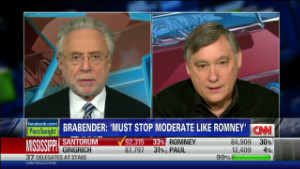
 Brabender on Santorum's 2 Wins
Brabender on Santorum's 2 Wins 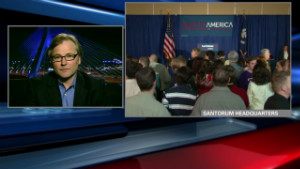
 Romney adviser on Santorum wins
Romney adviser on Santorum wins He won both, but not by a wide enough margin to hold down Santorum's numbers in the rest of the state. In the precincts that should have been friendliest to Romney, many voters stayed home.
In the 2011 gubernatorial primary, for instance, roughly 30,000 Republican voters cast ballots in Rankin County. That number dropped to 20,000 on Tuesday night.
In Madison County, 18,000 GOP voters showed up in 2011. On Tuesday, only about 7,500 showed up.
Romney will maintain his delegate lead after Tuesday night, but his campaign is still lacking a symbolic win in the South that would help erase doubts about his rapport with the conservative base. A few thousand votes might have made the difference.
Endorsements don't matter: Big-name Republicans have rallied to Romney's side in numerous primary and caucus states, but to little effect.
Romney nabbed big endorsements in Tennessee (Gov. Bill Haslam), Oklahoma (Sen. Tom Coburn), South Carolina (Gov. Nikki Haley), Minnesota (former Gov. Tim Pawlenty) and Kansas (former Sen. Bob Dole), but Santorum or Gingrich claimed victory in each of those states.
The pattern revealed itself again in Mississippi, where Gov. Phil Bryant and several statewide elected officials campaigned aggressively for Romney.
That robust establishment support in Mississippi gave the Romney campaign a glimmer of hope, but its expectations were dashed as the results rolled in.
It's worth noting a few exceptions to the endorsement rule, including Gov. Jan Brewer in Arizona and Gov. Rick Snyder in Michigan, each of whom endorsed Romney before key primary wins.
Evangelicals keep powering Santorum: In the end, Mississippi and Alabama looked a lot like Tennessee.
On Super Tuesday, the Romney campaign was optimistic it could secure a Tennessee victory in a three-way race, but a big evangelical turnout powered Santorum to victory and undercut its chances of netting that still-elusive win in the South.
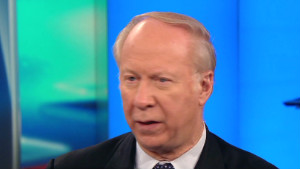
 South sweep 'psychologically damaging'
South sweep 'psychologically damaging' 
 Wolf Blitzer and Luis Fortuno on VP
Wolf Blitzer and Luis Fortuno on VP 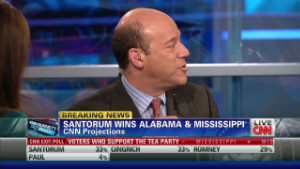
 Fleischer: No end in sight for this race
Fleischer: No end in sight for this race The same story unfolded on Tuesday.
Romney had raised expectations even higher in Mississippi and Alabama by barnstorming both states and professing his admiration for grits, catfish and the phrase "y'all." However, deeper cultural forces continued to work against the Massachusetts Mormon in his quest for a southern triumph.
Though early exit polls suggested that evangelicals were breaking to Romney in Mississippi, a later wave of polling showed Santorum maintaining his grip on the Christian conservative vote.
Eighty percent of Mississippi Republicans described themselves as evangelical or "born-again." In Alabama, that number was 75%. Romney trailed Santorum and Gingrich among those Christian voters in both states.
A county-by-county breakdown of the Mississippi results painted the picture: the heavily-Baptist eastern side of the state was Santorum and Gingrich territory, while the establishment-friendly Delta broke for Romney.
Sorry, Rick! Newt isn't dropping out: In his concession speech, Gingrich cast his two losses as a pair of wins and a mandate to soldier on with his presidential bid.
"Because this is proportional representation, we are going to leave Alabama and Mississippi with a substantial number of delegates, increasing our total as we go toward Tampa," he told supporters in Birmingham. "The elite media's efforts to convince the nation that Mitt Romney is inevitable just collapsed."
Though conservative calls for Gingrich to drop out of the race and help Santorum boost his effort against Romney are likely to escalate in the wake of Mississippi and Alabama, two states his spokesman recently considered must-wins, it's unlikely he will do so.
In the near term, at least, Gingrich happens to be right about the delegate math. While he trails Romney and Santorum by a wide margin in the total delegate count to date, Gingrich will probably emerge from Tuesday's southern primaries with about the same share of delegates as Romney.
None of the candidates are likely to reach the 1,144 delegates necessary to clinch the nomination before May or June. If no one hits the magic number before the Republican convention in August, one senior Gingrich adviser told CNN that a Santorum-Gingrich ticket might be brokered in Tampa.
"Newt Gingrich and Rick Santorum would be a powerful team against Barack Obama," the adviser said in an email late Tuesday.
Barbour boys step up: Move over, Haley! The weeklong Mississippi primary fight thrust two lesser-known Barbours into the political spotlight.
With former Mississippi governor Haley Barbour remaining neutral in the GOP race and avoiding the political spotlight in the wake of a series of controversial pardons that concluded his second term in office, his two nephews were the two most looked-to political operatives in news coverage of the primary.
While all five of Barbour's nephews were proud members of Sigma Alpha Epsilon at Ole Miss, only two of them played a role in Romney's Magnolia State push.
Austin Barbour, 36, is a national finance chairman for the Romney campaign. But he took on a larger role as the race shifted to Mississippi and was instrumental in lining up key endorsements for Romney across the state, including a nod from the governor.
Henry Barbour, 47, is a longtime political operative and a fixture on the Republican National Committee who originally backed Rick Perry's presidential bid.
Henry came around to Romney a little over a week ago, signing on as the Yazoo County campaign chairman, but he served as something of a Mississippi shaman to national reporters looking for insight on the state's political geography.
Both Barbours became must-follows for political junkies on Twitter, with Austin gleefully cheerleading for his candidate and Henry offering up guidance on what to watch for, county-by-county, on election night.
chemical technology program amberlite 400 chemical technology degree



0 comments:
Post a Comment